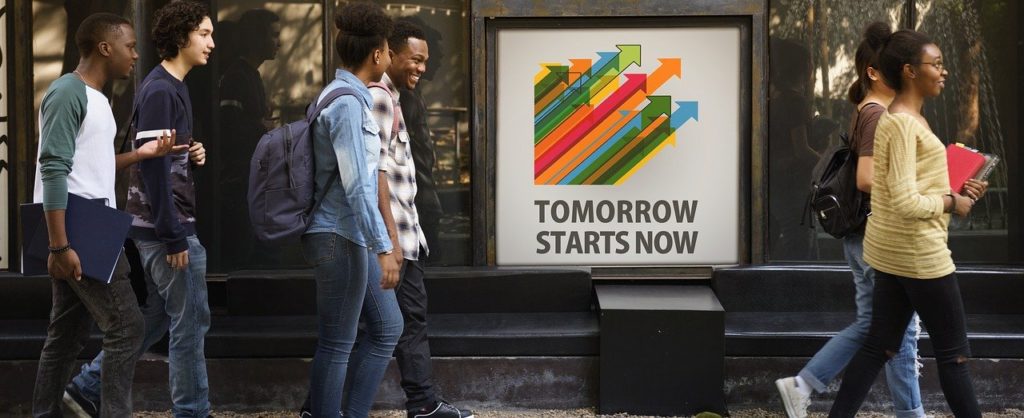We read a lot about the importance of helping our learners by incorporating 21st century competencies in the classroom these days. One of the reasons given is that many of the jobs our learners will do in the future don’t exist yet so we can’t prepare them for specific roles. How can you mentor your students and stay on track as a teacher in the fast changing world of work?
21st century education: focus on key competencies
In order to integrate 21st century skills in the classroom, we can put a focus on the sort of competencies that employers and researchers indicate are priorities in present-day working environments.
Along with being tech-savvy, a good communicator, a team-player and a problem-solver, critical thinking and creativity are two of the key abilities that frequently appear on the list of important skills. So, here are some questions to help you think about how you can future-proof your career as a teacher by adopting and displaying some key elements of 21st century education.
Are your resources up to date and relevant?
While there is nothing wrong with tried and tested learning materials dating back a few years, not having a sufficient amount of updated content at hand has its pitfalls.
Outdated resources will not take into account current changes and developments in society, education and science. Neither will they feature the latest technology. So if your goal is to promote 21st century competencies in the classroom, freshen up your teaching from time to time (sprinkling in bits of knowledge from your personal experience that can’t be googled is a good idea, too). Your students will thank you!
You can ask yourself:
- How many of the materials you use date back more than 3-5 years?
- Which new sources of materials have you used in the last year?
- What do you do or say in class that your students couldn’t find online?
The good news is, it has never been easier to find updated quality content for your lessons. All you need is a laptop (or tablet / smartphone) and an internet connection. TED talks are a great resource for teaching English while discussing hot topics with your students, and the variety of materials is huge. You can find out how to effectively use them in class here.

Are your lessons engaging and learner-centred?
Traditionally, institutionalised education has been centred around the authority of the teacher, with a ‘good’ student equalling an obedient one. Learners have been supposed to listen and pay attention, speak only when asked to and generally follow instructions. For anyone who has ever had to endure such a scenario, do you remember how restrictive and boring that was?
If you want to ensure that your students are engaged and present in your lessons while acquiring skills that will help them outside the classroom, take a look at the following:
- How often do you base lessons around student-generated materials?
- What do you do to make each class unique and memorable?
- To what extent do you show empathy with each individual learner and display knowledge of their specific needs and interests?
Getting your students on board can actually make your life easier. They may know more about certain fields than you do (e.g. technology), and thus can help you enhance your lessons.
Are you empowering your students?

As already mentioned, collaboration and creativity are some of the key competencies in our 21st century society. Unlike yesteryear, understanding patterns and being able to transfer and apply knowledge is more valuable than memorising large amounts of data.
Learning is much more about autonomy and social skills these days, with a good teacher stepping back a lot of the time in order to let students practice what they’ve learned. If you want your students to become creative problem-solvers who are capable of self-organisation, consider this:
- How do your lessons specifically help students solve problems large or small?
- How do you help your students research information as part of their learning?
- What different forms of pair and group work do you use to enhance learning via cooperation?
Understanding yourself as a go-to person whose job it is to be there for your learners when things go wrong rather than an all-knowing solo entertainer will simplify matters and help your students grow. Moreover, you will benefit as a teacher if you allow yourself to learn from them as well. And hey, it’s just more fun for everyone!
Do you keep honing your teaching skills?
The key to staying on track in any profession is to keep evolving. For this, talking to peers, sharing ideas and insights is invaluable. Other measures include a certain amount of self-scrutiny as well as adding new techniques to your repertoire every so often. Question time:
- Who do you cooperate with outside your class as part of your own development?
- How often do you record your lessons and then analyse and act on your findings?
- What have you done to increase your repertoire of different ways to start and finish your lessons?
There are lots of resources on the internet to inspire you to try new things; most of them by other teachers sharing their experience and what works for them. Besides, there are plenty of professional associations for teachers out there, so you don’t have to go it alone. With online forums and groups at hand, you may not even have to meet other teachers in person.
To get started, recording your lessons is a good way to evaluate and understand yourself better. Just see to it that you comply with the data protection laws of your country (only use the recordings for educational purposes and you may have to delete them after a while).
21st century education in the classroom: final thoughts
While creating a 21st century learning environment may seem challenging at first, it doesn’t have to be a big headache. With an abundance of online resources, groups and forums at your disposal, you can get a lot of free support. Moreover, encouraging your students to bring in their strengths will benefit them while making your job easier. Win-win!
For further information on 21st century education, you can watch the video below. It’s to the point and will fill you in on everything you need to know in order to understand the main ideas.
Happy future-proofing!






